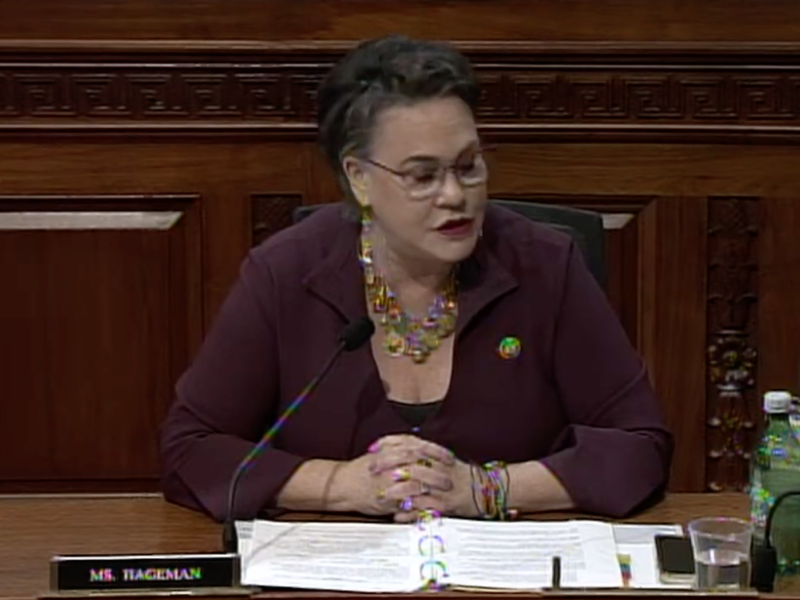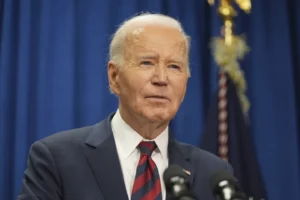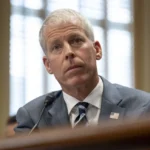Lawmakers Clash Over Hageman’s Bill Addressing ‘Energy Poverty’
Wyoming congresswoman says measure would increase transparency, while Democrats say it boosts oil and gas industry
- Published In: Politics
- Last Updated: Dec 16, 2023

Two proposals introduced by Rep. Harriet Hageman (R-Wyo.) concerning oil and gas development were debated during a House committee hearing earlier this week. (Photo via YouTube / House Natural Resources Committee GOP)
By Jacob Gardenswartz
Special to the Wyoming Truth
Rising energy costs in Wyoming and around the nation pose significant troubles for American families, lawmakers said during a House committee hearing earlier this week, noting such increases can have a devastating impact on poorer households and at-risk communities.
But beyond acknowledging the prevalence of the problems, the representatives found little agreement about the best ways to address them, with discussions on possible solutions quickly devolving into a partisan back-and-forth over the merits of climate adaptation and oil and gas development. The combative hearing illustrates the difficulty U.S. policymakers face responding to the threat of climate change, as Republicans and Democrats disagree about whether and how quickly humans must transition away from burning fossil fuels as a primary energy source.
Tuesday’s hearing of the House Natural Resources Committee’s subcommittee on energy and mineral resources was called to debate three legislative proposals currently pending before Congress: H.R. 5482, dubbed the “Energy Poverty Prevention and Accountability Act of 2023,” H.R. 6474, which concerns geothermal energy development, and H.R. 6481, which provides technical tweaks to the Inflation Reduction Act (IRA)’s provisions requiring certain fees for oil and gas development applications.
The first measure, introduced by Rep. Harriet Hageman (R-Wyo.) in September, attracted the majority of the debate. Testifying before the panel, Hageman blasted the Biden administration’s “war on fossil fuels,” arguing the president is “furthering energy poverty as an affirmative policy for the purpose of controlling human behavior and pursuing a radical climate agenda.”
To combat this, Hageman’s bill would mandate studies and reviews to determine the impacts of new federal actions on energy prices and at-risk communities, directing entities ranging from the U.S. Comptroller General to the White House Office of Management and Budget to the Congressional Budget Office to investigate how laws and regulations might raise or lower energy prices.

It also would require some entities pursuing development projects on federal lands to request studies into their possible benefits, showcasing potential job opportunities or energy cost reductions.
“My bill does not focus on an artificial, manufactured narrative, but rather looks at the cold, hard facts and the impacts on the pocketbooks of the people in America’s most vulnerable communities,” Hageman stated.
Yet Democrats on the panel rejected that characterization, instead alleging Hageman’s bill was really intended to boost oil and gas development.
“Everything in this bill is structured to help one constituency, and that is fossil fuel companies and executives,” said Rep. Alexandria Ocasio-Cortez (D-N.Y.), the top Democrat on the subcommittee. She blasted Hageman’s proposed studies as “very one sided,” charging that the measure “drastically oversimplifies the problem.”
“This bill does not address energy bills,” Ocasio-Cortez continued. “Instead, my colleagues across the aisle are exploiting the language of poverty in order to enrich private oil and gas interests.”
Witnesses split on best approach to lower energy costs
The witnesses testifying also were split as to the best ways to reduce Americans’ energy costs; those invited by the GOP majority supported Hageman’s proposal, while the lone expert invited by Democrats opposed it.
Derrick Hollie, a former Transportation Department official in the Trump administration and founder of the Energy Poverty Prevention Project, praised Hageman’s bill and attacked the Biden administration as “destroying America’s energy independence.”
Hollie, who is Black, highlighted the impact of rising energy costs on “vulnerable populations like minorities, senior citizens, and Native Americans,” suggesting that “radical environmentalists” and others opposed to oil and gas development are “pushing back Black Americans and other at-risk communities further into poverty.”
J. Mijin Cha, an assistant professor environmental studies at the University of California, Santa Cruz, conversely praised the goals of Hageman’s bill but argued her approach was “counter to combating energy policy.”
Hageman’s measure “paints the most positive view of the fossil fuel project and not taking into consideration also the contribution that it could have to the climate crisis,” Cha testified, noting that the proposed studies consider the benefits of new development but not “any externalities that are caused: the air pollution that is caused, the poisoning to land, air and water for those communities.”
Cha proposed reinstating a ban on the exports of crude oil from the U.S., a policy in place from 2009-2015, as a better approach to lowering energy costs by ensuring Americans don’t pay a premium on imported fossil fuels. She also suggested better funding programs that provide needy families with government assistance on energy bills.
Such suggestions, however, did little to sway Hageman’s convictions.
“This administration has adopted [an] energy policy that is intended to increase the cost of energy, and then they want to turn around and provide additional welfare payments to the people who suffer for those policies,” Hageman claimed. “That isn’t the way that we can keep the lights on or provide the energy that we need.”
Geothermal, fossil fuel leasing bills attract less controversy
The other two measures debated in Tuesday’s hearing attracted far less controversy and even some bipartisan praise.
H.R. 6474, sponsored by Rep. Michelle Steel (D-Calif.), would amend existing laws to speed up geothermal energy development projects — those which utilize the stable temperature deep underground to provide heating and cooling opportunities — on lands that had been studied or developed previously.
Speaking in favor of the measure was Bryant Jones, executive director of the industry trade group Geothermal Rising. He testified that, under current policies, geothermal power projects can require as many as six different environmental reviews to be approved, leading to projects taking close to a decade to finish.
Steel’s measure was boosted by the support of Rep. Susie Lee (D-Nev.), who suggested geothermal energy has “immense promise, both economically and environmentally” yet remains “largely untapped.”
And the final bill debated, introduced by Hageman last month, similarly received little pushback. H.R. 6481 would amend the IRA to ensure that fees imposed on industry “expressions of interest” for oil and gas drilling on federal lands would only be due if the lease sales go through.
The IRA instituted a $5-per-acre fee to ward against speculative leasing, whereby drilling companies can tie up wide swaths of land with little potential for energy development and prohibit conservation efforts.
But some companies have found themselves on the hook for those fees even if their proposed projects don’t pan out. Hageman’s measure “allows producers to get what they paid for, and to be reimbursed when leases are not issued,” the congresswoman argued.
Kathleen Sgamma, president of the Western Energy Alliance, a group representing oil and gas companies, praised the measure.
“The government is in the inappropriate position of charging for nothing,” she testified. “It is inherently inequitable to compel one party to pay for something another party receives.”













